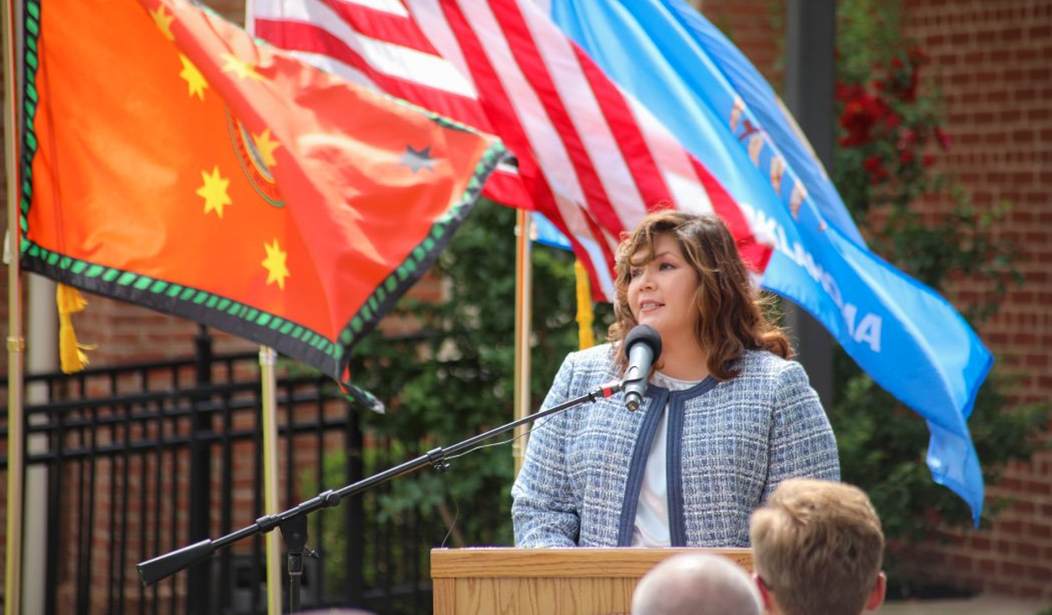The United States may have a chance to make some small restitution for the Trail of Tears. The Cherokee Nation, whose lands were effectively stolen by the State of Georgia and President Andrew Jackson, has requested a seat in the House of Representatives. According to the terms of the Treaty of New Echota, the very treaty by which the Cherokee surrendered their lands and agreed to move West, the tribal nation may have a seat in Congress, if Congress allows it. The tribe’s head chief has nominated a former Obama staffer for the post.
“[Cherokee Nation] Principal Chief Chuck Hoskin Jr. says the tribe is taking historic initial step to enact its treaty right to send a delegate to the U.S. Congress. Chief Hoskin is nominating Kim Teehee, the tribe’s current VP of government relations, to serve as the delegate,” the tribe announced on Twitter Thursday.
#CherokeeNation Principal Chief Chuck Hoskin Jr. says the tribe is taking historic initial step to enact its treaty right to send a delegate to the U.S. Congress. Chief Hoskin is nominating Kim Teehee, the tribe’s current VP of government relations, to serve as the delegate. pic.twitter.com/NSlvRB9XbF
— CherokeeNation (@CherokeeNation) August 22, 2019
“It is stipulated that they shall be entitled to a delegate in the House of Representatives of the United States whenever Congress shall make provision for the same,” the treaty reads.
“The Cherokee Nation is today in a position of strength that I think is unprecedented in its history,” Chuck Hoskin Jr., who was sworn in as the tribe’s principal chief this month, told CNN. The tribe has nearly 370,000 members.
The treaty does not specify whether or not the Cherokee Nation delegate would be a voting member of the House of Representatives, and Hoskin himself said the position might resemble the non-voting members that represent Washington, D.C. and the five U.S. territories. Those territories include American Samoa, Guam, the Northern Mariana Islands, the Virgin Islands, and Puerto Rico. These representatives cannot vote on the House floor, but they can vote in committees that they are on, introduce legislation, and engage in debate.
“I think we have to look at the roadmaps that are laid out as a suggested path to seating our delegate, and certainly the delegates afforded the territories give us an idea of what is workable in the Congress,” the chief said.
Hoskin nominated Kimberly Teehee, the tribe’s vice president of government relations, to the post. She previously worked as a senior policy advisor on Native American affairs for three years under President Barack Obama. For twelve years before that, she served as senior advisor to Dale Kildee, then a Democratic congressman from Michigan.
In order to represent the tribe, Teehee has to be confirmed by the Cherokee Nation’s tribal council on August 29. At that point, Congress will need to take legislative action. As the treaty says, “Congress shall make provision.”
Hoskin said the tribe plans to continue conversations with Oklahoma’s representatives in the House and begin crafting ideas about what the legislation will look like. He said the process will likely be “long,” but they are prepared for the work ahead.
Ezra Rosser, a law professor at American University, told CNN that there may be opposition to the move, since the Supreme Court has upheld legislation that infringes on U.S. treaties with tribal nations.
Yet this seems unlikely. The Trail of Tears is widely regarded as a black mark on American history, for good reason. After 1828, Georgia passed laws abrogating the Cherokee Nation’s independent government and extending state law over the territory. The U.S. Supreme Court struck down these laws in Worcester v. Georgia (1832), but Georgia disregarded the ruling and President Andrew Jackson refused to enforce it.
After gold was discovered in Georgia, settlers rushed to the state and many of the Cherokee accepted the loss of their lands as inevitable. The “Treaty Faction” negotiated with the White House and agreed to the Treaty of New Echota. By that treaty, the tribe sacrificed all land east of the Mississippi River in exchange for $5 million (to be distributed per capita to all members of the tribe), an additional $500,000 for education, title to land in Indian Territory, and full compensation for all property left behind. The treaty allowed Cherokee who wished to remain to become citizens of the states they lived in, and an early provision promised them 160 acres of land (Jackson struck out that provision).
While the treaty provided a two-year grace period for Cherokee to willingly leave to Indian Territory, President Jackson sent General John E. Wool to round up the people and prepare them for removal. The vast majority of the Cherokee considered the treaty fraudulent, however, and most were unwilling to leave. The military forced the Cherokee to leave, resulting in thousands of deaths.
America now has the chance to offer some restitution for this horrific tragedy, and I reckon both Republicans and Democrats will agree to allow Teehee to join Congress. While many Cherokee viewed the Treaty of New Echota to be illegitimate, the U.S. Senate did ratify the treaty, and it should be considered binding on the U.S. government.
Conservatives may see it as unfortunate that Hoskin named a former Obama staffer to the position, but if Hoskin is to be believed, the Cherokee Nation is willing to accept that Teehee will not be a fully voting member of Congress.
Follow Tyler O’Neil, the author of this article, on Twitter at @Tyler2ONeil.








Join the conversation as a VIP Member